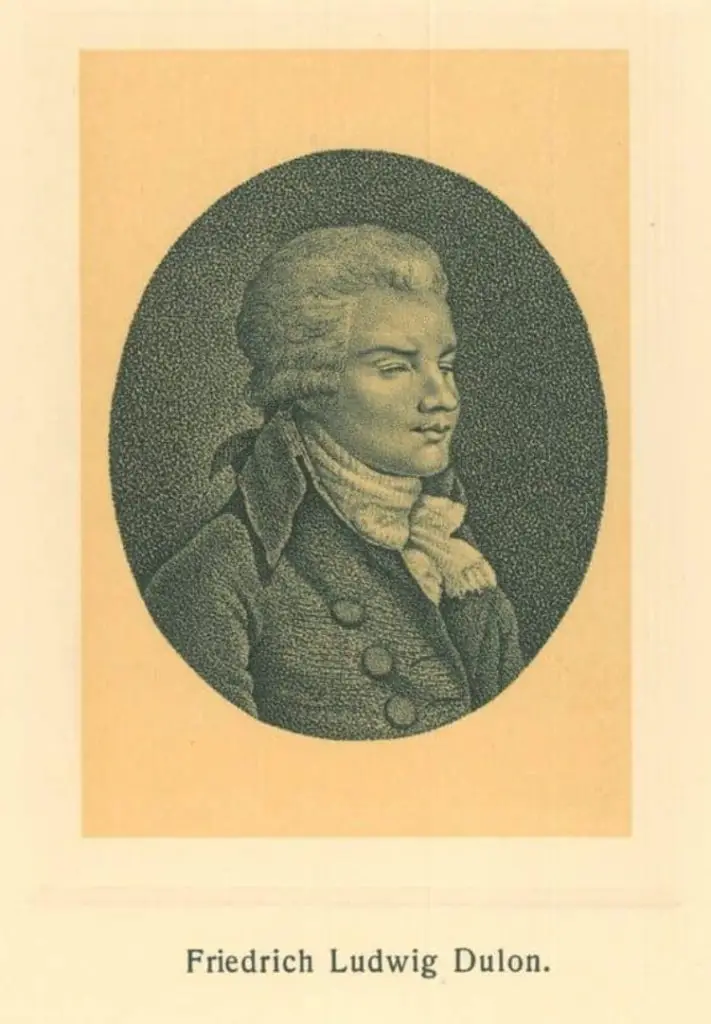
Friedrich Ludwig Dülon (14 August 1768 – 7 July 1826) was one of the most prominent and celebrated flute virtuosos of the Classical era, recognized as one of the first flutists to be considered gifted on the Western concert flute.
By the age of 40, he had amassed a repertoire of over 300 concerts.
Christian Friedrich Daniel Schubart dedicated a nine-verse poem titled “The Blind Flute Player Dülon on the Journey” to him.
Born in Oranienburg, Dülon went blind at just six weeks old due to an eye infection caused by medical malpractice. This did not deter him from pursuing music lessons, initially with his father, a music-loving tax official, and later with organist Johann Karl Anderson (1774–1815), who taught him piano and figured bass, and the equally blind flutist Joseph Winter, who arrived in town on 16 March 1778.
By the age of nine, Dülon had already composed a minuet, demonstrating his musical talent. He naturally played Quantz’s flute concerto, learned by heart from listening to his father, and improvised and dictated his compositions for transcription. A year later, the prodigious Dülon was performing as a soloist in Stendal. His first public concert took place in Berlin on 9 October 1781, marking the beginning of his renowned career as a touring virtuoso.
Throughout the 1780s, Dülon toured Europe extensively with his father and sister. During a visit to Carl Philipp Emanuel Bach in Hamburg in 1783, he performed the A-minor sonata, impressing Bach, who remarked on the irony that the king, for whom the sonata was written, could not play it, unlike the blind Dülon. Dülon suggested Bach play his Hamburger Sonata in G Major, Wq. 133 instead. He was also friends with Karl Benda, son of Czech violinist and composer Franz Benda. In the summer of 1789, Friedrich Hölderlin took flute lessons with Dülon in Tübingen.
By 1787, Dülon’s travels had taken him to Leipzig, where he played duets with Johann George Tromlitz, to Berlin, where he met Johann Philipp Kirnberger and Johann Friedrich Reichardt, and to London, where he performed at court.
In October 1790, he encountered Wolfgang Amadeus Mozart for the first time during the festivities for Emperor Leopold II’s coronation in Frankfurt and later at one of Dülon’s concerts at Emanuel Schikaneder’s Theater an der Wien in Vienna on 15 April 1791, where he played a flute concerto by Giovanni Mane Giornovichi with his brother-in-law, Herr Reinstein.
He then spent about five years in St. Petersburg from 1792 as a royal musician before returning to Germany in 1798 with a pension granted by Emperor Paul I of Russia.
From 1800, Dülon resided in Marienburg, where he wrote his autobiography using an alphabet invented for him by a college professor in Dresden. In 1823, he moved to Würzburg, where he died on 7 July 1826.
Flute compositions
Dülon’s surviving compositions include a flute concerto, 16 duos, and a set of 11 caprices for solo flute:
- Duets Opus 6 No. 2 in D major for Flute and Viola
- Duets Opus 6 No. 2 in G major for Flute and Viola
- Duets Opus 6 No. 3 in D minor for Flute and Viola
- Duo Opus 5 No. 1 for Two Flutes
- Duo Opus 5 No. 2 for Two Flutes
- Duo Opus 5 No. 3 for Two Flutes
- Three Duos Opus 6 for Flute and Viola
This event has passed.
Friedrich Dülon died in 1826

